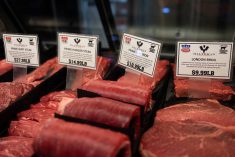The North American trade agreement signed only five years ago must be reviewed by 2026, but I don’t know why Canada would want to continue the process, given that U.S. president Donald Trump’s administration has shown it will not be constrained by any international agreement.
I expect that Canada will have to go through the motions and try to make the best of it.
Follow all our coverage of the tariffs situation here
Read Also

Pakistan reopens its doors to Canadian canola
Pakistan reopens its doors to Canadian canola after a three-year hiatus.
But any future agreement is worthless unless it tackles a huge problem in the existing deal’s language that allows parties to set aside its provisions in cases of “essential security.”
Article 32.2 (b) of the existing U.S.-Mexico-Canada Agreement states that nothing in the agreement shall be construed to “preclude a party from applying measures that it considers necessary for the fulfilment of its obligations with respect to the maintenance or restoration of international peace or security, or the protection of its own essential security interests.”
Trump argues that he can levy tariffs to address the threat to American security presented by undocumented migrants and drugs, namely fentanyl.
The administration argues it can act without the involvement of the U.S. Congress by right of the U.S. International Emergency Economic Powers Act.
These arguments and assumptions could be tested in an American court and perhaps through the trade dispute settlement process, although the difficulty of launching a case and the time it would take for it to be argued, judged and likely appealed make such an effort meaningless.
In reality, Trump’s emergency declaration is a cover for his current whims and desire to blame America’s problems on outside actors.
Unrestricted migration and drug addiction are serious problems that should be addressed, but they are not an existential threat to the survival of U.S. warranting an emergency declaration.
To meaningfully deal with them would require hard work from the American government to overhaul its immigration laws and implement health and economic policies that address the root causes of addiction.
It must also be recognized that migration and drug smuggling are largely an issue at America’s southern border and are relatively tiny at the Canadian border.
As well, migrants and drugs are not the president’s only issue. His interests shift daily, sometimes hourly.
Whatever concerns he has with America’s closest trading partners, they could have been addressed rationally and collegially.
But in these continental issues, as with issues of international security and co-operation, Trump prides himself as a disrupter intent on upending a liberal international order created since the Second World War, largely through the efforts of the United States.
Some of this order was even created by Trump himself.
In his first term he demanded renegotiation of the North American Free Trade Agreement, which he called “perhaps the worst trade deal ever made.”
The three parties renegotiated the deal, borrowing from improvements that were already worked out under the Obama administration through talks toward the Trans-Pacific Partnership that the U.S. backed out of as soon as Trump came to power.
One of his demands was a name change, turning it into USMCA, of course putting the U.S. first.
Trump then called it “the fairest, most balanced and beneficial trade agreement we have ever signed into law.”
But as Innu Manic, a fellow for trade policy at the Cato Institute, noted at the time, the name change was not just cosmetic.
Under Trump, it no longer is about making North America a powerhouse trading bloc. It is now about the U.S. being a dominant power that can bully its two weaker partners.
I expect Trump’s goal in the coming review of USMCA will be to make Canada and Mexico even more subservient.
Trump’s redefining of America’s role in the world in trade and geopolitical terms is creating chaos.
The U.S. has always acted with self-interest, but its raw power has been softened with moral leadership, promotion of democracy and financial support of global health and human rights initiatives.
A world without American leadership is a more dangerous and less prosperous place.
However, Trump’s abandonment of America’s traditional role shows that Canada and most other countries in the club of democracies relied too much on American good will and protection.
It is a wake-up call that all must work to be strong enough economically to carry their share of the cost of ensuring freedom and security.
But America also must realize that if it chooses to follow the Trump way, abandons its pretentions of being a Great Beacon of Light and instead becomes a bully interested only in transactionable interests — I’ll do something for you only if it benefits me — then it will find itself lonely in the world, without friends and allies, but with only grudging clients.
To contact D’Arce McMillan, email newsroom@producer.com.















